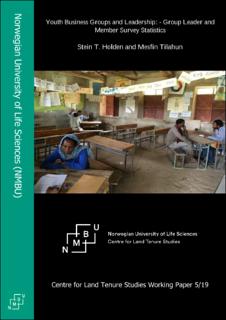Resource information
This working paper is an output from the research project “Youth Business Groups for Sustainable Development: Lessons from the Ethiopian Model” that is funded by Research Council of Norway under the NORGLOBAL2 research program for the period 2019-2022. This working paper provides a summary of baseline survey data collected in the period January-May 2019 primarily from 2427 sampled members of 246 active youth business groups in four districts in the Tigray Region of Ethiopia. The large majority of the active groups are functioning well and have overcome the potential collective action problem associated with self-organization. Most group members are satisfied with their group boards and group leaders and are able to change board members that do not function well. Their bylaws facilitate and enforce compulsory participation in group meetings and group work activities. Equal sharing of incomes and work responsibilities is the dominant principle. Punishment for violation of group bylaws is practiced with graduated sanctions that are socially accepted by the large majority of group members. Most group leaders were motivated to continue as group leaders, only 4% were unmotivated, although 67% of the group leaders found the job to be challenging or very challenging. The group leaders were inspired by the good social relations in their groups, and by that they learned a lot from being group leaders. 68% of the group leaders stated that the group performance had improved over the last three years and only 14% that it had deteriorated. Most groups have been able to protect the vegetation on the allocated land and according to the group leaders the vegetation has improved on the land of 81% of the groups and has been stable for another 14% of the groups. Most groups have been able to establish a system with border demarcation, fencing and/or guarding such that the problem with illegal harvesting by outsiders has been reduced. Most youth group members are environmentally conscious and willing to take their part of the compulsory annual 20 days of work for free for conservation of the natural resources in their community.

